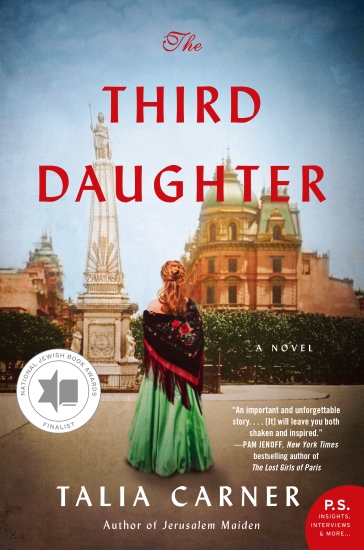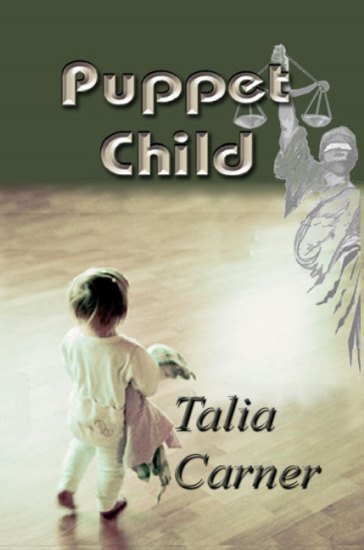Prologue
Rachel Belmore was jolted from a dream, awash with dread. “The baby!” the words crashed against her temples. Her breathing came in gasps.
Still groggy from the pill Wes had given her, she sat upright in bed and listened. No sound reached her. Wes, careful not to disturb her, must have slipped out of bed and closed the bedroom door she insisted on keeping open.
She dropped her head back on the pillow. Since Ellie’s birth eleven months before, Rachel’s sleep only skirted the periphery of dreams. The night before, she had lain in the dark next to the sleeping Wes, her ears attuned to any rustle coming from the nursery, her tense body ready to leap with the slightest new sound-or after a prolonged silence.
“How do you expect to keep up your strength without sleep?” Wes asked in the morning when she dashed out the door for a nine o’clock client meeting. She had been up since seven, feeding and playing with Ellie. “Certainly not with a full-time career.”
Before bedtime, he handed her a vial of sleeping pills brought from his office. “Take one Saturday and Tuesday; I’ll do all the getting up when no surgeries are scheduled in the morning,” he said. “As your private physician, I order you to get a good night’s sleep. Starting tonight.”
In response, Rachel made a playful salute and clicked her heels. She loved to make him laugh; it made her feel witty, sprightly. Dr. Wesley Belmore’s love for her was the mirror from which her own image reflected back at her, and where she saw a winner.
The whirring stillness of the room closed in on her. “The baby.” The words continued to bang inside her head. Why hadn’t Wes returned if Ellie was fine? Rachel pushed herself out of bed and rushed toward Ellie’s room. In the dark corridor she nearly knocked over the sculpture stand.
At the door to the nursery she froze.
In the darkness, she could barely discern Wes’s silhouette bent over the crib. To her disoriented mind, his body appeared contorted. A stranger’s figure.
Was she hallucinating?
Rachel’s muffled groan made Wes straighten. He turned slowly, and let out his low, throaty laugh, full of savoir-faire. Instantly, it wrapped her in its warmth.
“Are you okay, honey?”
“Is she all right?” she whispered.
His long fingers reached gently toward the soft hair on Ellie’s head. “We have a beautiful baby,” he replied, awe in his voice.
“What were you doing?-” Rachel clammed up. She moved closer to the crib and stared down. Ellie slept, her breathing dry and even. It was madness. Even if sleeping medication swam in her brain, she must be suffering from a protracted postpartum depression to even think-
Ellie’s finely carved mouth puckered and moved in a sweet sucking motion. She stirred and brought her thumb to her mouth.
“She’ll have buck teeth,” Rachel said, still staggering in an air pocket of dread.
“Relax, honey.” He drew Rachel to his chest and planted little kisses on her face.
“Relax?” she mumbled into his silk paisley robe. She breathed in deep. She adored his smell. “Who said, ‘To have a child is to forever have your heart go walking around outside your body?'”
“She’s fine.” He drew her closer. “Remember, I’ve been through this before.”
She hated to be reminded of his other daughter. Was it possible he loved another child as much as he loved Ellie? It had been several years since Stephanie’s mother moved to southern New Jersey, two hours away, which made visiting with his child difficult. Whenever Wes spoke of it, it was with an atypical fury, and his eyes, pulsating with anger, scared Rachel. Accustomed to being in charge, Wes had no tolerance for events that took their own turn.
Grateful that he didn’t bring up his former wife, Rachel allowed him to lead her back to bed. He spooned her in his arms. “I love you,” he murmured, and rocked her to sleep.
But for months, the insane suspicion, the improbable vision of what she thought she had seen in the shadows, kept tormenting her. When she prepared a client sales presentation, Wes’s image would pop up and project itself on the screen. Even while her body was swept up in his tender lovemaking, a mental image of his figure lurking in the shadows would force its way to a spot behind her eyes.
She distrusted herself, convinced her mind was deranged. Hugging Ellie, Rachel forced herself to remember how lucky she was. Their Fifth Avenue penthouse offered her a ringside seat on life, her own private show in which every act complemented the other. It was lunacy to think otherwise.
A year later, exhausted from a one-day round-trip business flight to Memphis, Rachel gave Ellie her bath and tucked her to bed. Then, wanting to keep Wes company in his study, she lay on the couch. Sometime later, through a gauzy curtain of sleep, she felt his strong arms as he lifted her and carried her to their bedroom. Gently, with the delicate yet assured hands of a competent surgeon, he removed her shoes and clothes, and tucked her under the satin sheets. She drowned in their coolness, sucked down as though by an undertow, and slept.
She hit the surface of wakefulness with a start.
She sat up.
The green glow of the digital bedside clock bounced off the mirror above the antique dresser. Three-thirty. It took her a moment to realize it was not afternoon, but the middle of the night.
Instinctively, she listened for sounds of Ellie. Lately, the two-year-old would wake up several times during the night. With Rachel’s cooing and singing, she would finally fall back to sleep, but she thrashed about, getting entangled in her blanket. Rachel kept checking on her, fearing she would smother.
“People who say they sleep like a baby usually don’t have one,” Rachel had commented one morning after a sleepless night, and Wes responded with his open, warm chuckle.
No sounds reached Rachel now as she cocked her ear, her eyes trying to penetrate the darkness. The room was silent and still. Once again, even though she had demanded that Wes leave the baby monitor on, he had turned it off to ensure her uninterrupted rest.
What made her open the door with the stealth of a thief? What made her tiptoe ever so lightly on bare feet, sliding along the corridor wall until she reached Ellie’s room?
The scent of baby lotion and fabric softener wafted to her nostrils. The faint light of the new Mickey Mouse nightlight, bought in response to Ellie’s panicked crying at bedtime, outlined the doorway. Although Ellie, at almost two, couldn’t speak yet, Rachel knew her baby was terrified of the dark.
She hugged herself against the chill and held her breath. She heard the tiny sounds Ellie emitted in her sleep, a cross between lip smacking, thumb sucking, and a gurgle.
Rachel peeked in.
The pale halo of light was golden, outlining Wes’s back. His body was contorted in the position she had seen in her nightmare.
Silently, Rachel glided in and rounded his body.
Through the crib bars, she saw Wes coaxing his penis into the baby’s mouth to suckle in her sleep.
She had seen it right that night over a year ago.
Time stopped, hovered, and quivered before it exploded into a million fragments. Rachel screamed.
PART ONE
“Cross my heart and hope to die.”
Chapter 1
In the reception area of Chuck Bernstein’s law office, Rachel took a deep breath and relaxed her fists. She extended her fingers and touched the white spider mums in the vase on the side table. The current issue of Business Week, her must reading, lay beside it. She picked it up, leafed through it, and dropped it back. She wasn’t up to it. Not now.
She stood and walked around. The receptionist raised her head and gave her a sketchy smile, then went back to her typing. Rachel sat down again. She bit the side of her lower lip.
It had been three years since she had taken her daughter and fled from Wes in the middle of the night, a wild woman with the wind in her hair. Ever since, it had been Wes’s word against hers. She accused, he denied, she insisted, he denied again. With her world devoid of possibilities, she was running out of legal options. What was there left to do?
Chuck touched her shoulder, and she jolted before she caught herself. As she got up, she adjusted her suit skirt. It hung too loose. And she had believed she couldn’t lose more weight.
She followed Chuck into his office, cleared the files from one of the upholstered guest chairs, and sat down, dropping her briefcase on the floor next to her.
Across the desk, Chuck’s kind, dark eyes gleamed bright and enlarged behind his glasses. His face, rumpled like an unmade bed, was pensive. He touched a pink memo note. “The word from Judge McGillian’s office is that he won’t tolerate any more adjournments. This is to be the last day of the trial.”
“Hurrah,” Rachel replied in a flat voice. “He’s the one approving these damn postponements. If he delays again, I want you to move the case to another court.”
“One more time—and in the middle of a trial? Do you want a new judge, who’ll have no time to learn the details? He won’t be allowed to review the history of the case and won’t understand what you’ve been going through—”
She interrupted, “Neither does McGillian—”
“But he knows the previous charges against Wes even if they had been cleared and McGillian’s supposed to ignore them. He hasn’t had a lobotomy.”
“Chuck, I want results.”
He leaned back in his chair. “McGillian won’t stop Wes from seeing Ellie, but I expect him to block Wes’s unsupervised visits.”
She sighed. “Whatever made me think that by running away I could lock the door in Wes’s face?”
“Parental kidnapping is never the answer.”
“You’d think I flew to the Amazon and disappeared in the jungle.” How she wished she had. “It was only Jacqueline’s apartment downtown, for heaven’s sake. Then got my own place in Long Island.” Rachel stopped. At Chuck’s high hourly rates, it was no use dredging it all up.
“Nevertheless, you established a history of kidnapping.” Chuck studied her. “It doesn’t help when we’re now up against a custody trial. But I have all the witnesses lined up—”
“More experts, pitted against one another. Another parade of social workers, doctors, and therapists.” Ellie lost with each spin on the legal spiral. “I can’t take losing. Chuck, no unsupervised visits. That’s my bottom line.”
“I know. But there are always surprises. These judges have seen and heard it all. The cases they hear are no more than a Chinese menu of grievances and wrongs: Column A and Column B. The differences are in the variety of combinations. The smells and flavors are the same.”
“Great. Keep on reminding me that I feel like Chop Suey.”
Chuck smiled wanly. “Look, if all else fails, we’ll bring in Stephanie. That’ll be our next round of ammunition. McGillian may have to allow her testimony now that she’s eleven.”
Rachel leaned forward. “Do you think she can handle telling it all in court? What can she remember after so many years?”
“She’s testified well enough to convince the New Jersey judge to forbid Wes to even call or write her.”
Rachel sighed. “I’ll call her mother whenever you say.”
“We’ll have to first argue the admissibility of her testimony.”
Rachel’s voice rose. “But it would prove what Wes is capable of.”
Chuck lay down his pen. Like a broken record, he repeated the analogy he had used before. “If you robbed a liquor store on Tuesday at ten, wearing a ski mask and carrying an Uzi, that doesn’t mean you were the one who robbed a liquor store on Wednesday at ten, wearing a ski mask and carrying an Uzi. That’s the law in its strictest sense.”
Chuck had the patience of a geriatric nurse explaining the concepts over and over as if to a dimwit. “That legal logic may make sense to you,” she said, “but not to me. This is not justice.”
“It’s how the system works. You have to connect all the dots in each case.” He peered at the papers on his desk. “And even then, you should be ready for all the possibilities.”
“Don’t you always tell me to entertain positive thoughts?” Rachel spoke with a forced light tone into the bald triangle on his temple. “Now you tell me not to get my hopes up. Which one is it?”
“I want you to reserve your energy for this last time.”
“Sure,” she said, sarcasm in her voice. “Trust that nice man—that chauvinistic bastard.”
Chuck raised his gaze, their eyes locking. “McGillian knows his law; he’ll see the light.”
Rachel waited in the reception area while revisions were made to the documents Chuck would file in court. She stared blankly at an ashtray. How appalled she had first been at her inability to keep Wes away from Ellie legally. Her ranting and raving subsided in time as the court battles raged on, but giving up the fight had never been an option. Instead, a black hole had opened inside her with an infinite capacity to suck in emotions. Like now.
Chuck came out and placed the papers before her. He stood over her and wordlessly pointed at the places awaiting her signature.
When she was done, he straightened up. He looked shorter standing than sitting. “I just got a call from Henry Ortman. Wes’s girlfriend has moved into his apartment as per Ortman’s suggestion. Ortman trusts it should put our minds at ease regarding the Fourth of July visit. It won’t be unsupervised.”
“Ortman ‘trusts?'” Wes’s lawyer was as sly as his client. “Chuck, you don’t buy it, do you? They’ve tried it before.”
“It’s the best we can hope for, for now.”
Rachel felt the blood rush through her. “All Wes needs do is to send her to the supermarket or to get her nails done and he’ll be back to his old tricks.”
“Don’t you dare deny him visitation before the next hearing.”
“One more denied visit won’t make a difference—”
He cut her off. “It would—in McGillian’s mind—when determining custody. Especially if you have Ortman’s guarantee.”
How could she take the chance? Rachel got up and flung her jacket over her shoulders. “Chuck, do we still have this appointment with the Assistant D.A.?”
He nodded. “I’ve filed the complaint in criminal court. The Nassau County D.A. hates to lose cases. In election year especially, he’ll prosecute only if he can win, or he won’t touch it.”
“Do I have to meet with him too? I can’t afford more time off work.”
“You’ll be back at the office by lunch.” He paused. “Vince Carducci still gives you a tough time?”
“How can I explain to him the nature of my court appearances? He’ll never understand—”
“No one ever does unless they lived through the justice system,” Chuck said.
“He’ll hit the ceiling when I tell him I’m taking another day off—even though I’m using vacation time—”
“Be there.” Chuck’s finger touched a thick brown curl on her shoulder. “Put your hair up, and don’t look so beautiful. The red suit is too assertive. And no matter what, please don’t cry.”
At his words, tears gathered up behind Rachel’s eyelids. She would not cry. She would wrestle her hair into a French braid. She would use a pale lipstick. But the pain within her would continue to grow fat on her misery.
At the door, instead of his customary handshake, Chuck kissed her on the cheek. “Go to the beach this weekend. Have a date with Gerald. Whatever. Just relax.”
“While I send Ellie to Wes?”
“You have a whole weekend with her before Monday. Enjoy it.”
“You know, Chuck, when I was a baby, every time I burped, my mother said it was the birth of a star,” Rachel said. “What happened?”
He laughed. “She was right. You are a star. In my book, you light a whole galaxy.”
Instead of taking the taxi back to her office, Rachel strolled up along Fifth Avenue. It was a rare summer day when the air was crisp and cool, giving vibrancy to the brushed brass and polished chrome of the stores’ window frames and distilling all impurities till the displayed merchandise came to life in sharp, colorful lines. She glimpsed a moving silhouette reflecting back at her. If it weren’t for the refined yet decisive stride and uptilt of the head, she would not have recognized herself in the young woman whose face was a play of shadowed planes and deep-set eyes, a face lovelier and more poised than she felt. She slowed down. Tomorrow might be another oppressively hot day, making a relaxed stroll down Manhattan streets impossible.
At the tail end of lunch hour, the suit-clad working crowd was dwindling, giving way to the multitudes of tourists in shorts and belt pouches. Rachel bought a bottle of cold, peach-flavored water. As she ambled on the west side of the street, keeping to the narrow strip of shade, she took small sips from the bottle. Careful not to jostle the tourists holding cameras to their faces, she studied the top of the buildings across the street. Exploring the architectural details stilled the scream of despair that rumbled inside her. Ever since she had taken a course about the Avenue during her maternity leave five years before, she found comfort in the beauty of the ornate windows, roof gargoyles, verandas, banisters, and turrets that decorated the upper sections of the pre-World War II buildings.
She stopped at a street vendor, his display of toys spread on a rickety table. She touched each item, turning it to check its construction and safety, and settled on a string puppet and a storybook. She’d keep the puppet for those moments when Ellie would have a temper tantrum and need to be distracted with a surprise.
At Fifty-second Street, Rachel turned east and crossed the block to Madison Avenue. With a rare lightness of step, she entered a building where she had scheduled two appointments at an advertising agency. Her corporate sales job at Women’s Life magazine provided normalcy and the income to keep feeding the justice machine. Every sale of an ad page meant more money for filing fees, attorneys, and expert witnesses. And at the end of three years of legal battles in which she had so often been branded unstable and given to hallucinations, her work was the one place where she retained her old composed self. Once upon a time there had been weeks when work offered the background music to portentous decisions such as what shoe brand to buy, the scheduling of a weekend tennis game, or the amount to be written on a charity check. Now it was the oxygen line that kept her life functioning.
During the routine meetings with clients at both the media department and account services, Rachel shifted her emotions to neutral and navigated the discussions with ease. After two hours, she sealed a four-month negotiation with a commitment to advertise Compton Foods’ new product launch.
Yet back at her office for the remainder of the afternoon, the thunder of panic over the coming trial gathered force. She must keep it all in check. Later there would be moments when her daily pressures would peel away, leaving her raw to do nothing else but feel for Ellie.
She was busy making notes at her desk when she raised her eyes to see her ad director’s lanky figure leaning on her doorframe.
“What’s up?” Vince asked. A lazy smile spread across his face, darkening its grooves with a five-o’clock shadow. His Nicole Miller sports-theme tie lay askew over a loosened button.
“Had a great day,” she replied with remnants of the exuberance she had felt when leaving the agency. “Compton Foods is coming in with a full schedule for a new diet entree. One million dollars.” There was no need to mention the obvious—her commission.
Vince let out a chuckle. “As long as Women’s Life keeps its number one position in the field, advertisers will automatically come on board.”
Rachel’s old resentment rose up. “Vince, I didn’t just sign up an order. You know that. If I may say so myself, it took wits and persistence to get on their ad schedule—” She caught her sharp tone and stopped.
He examined her face for a moment. “You okay?”
“I’ll be all right.”
“I’m your buddy. You can talk to me. Still having problems with your ex?”
She nodded, but said nothing. Vince would find the litigation, the reasons for it, tacky.
When he did not move from his position at the door, Rachel uncoiled herself from her seat and made a show of picking up a stack of stapled papers from her windowsill. “Next week I’ll give you a run-through of the presentation for the Baroness account.”
“Rake them in. We’ll be ready with prominent positioning,” he said, referring to the magazine page layout, a well-studied map of prized real estate. Advertisers vied for the most advantageous exposure for their ads. Like a prime storefront rental, Women’s Life‘s sales force secured the best spots with multi-year contracts. “Location. Location. Location,” he chanted.
“It takes more than location to bring them aboard.” Rachel smiled.
“You bet it does. That’s what you have an expense account for.” Vince continued. “You haven’t done much entertaining this year. Why don’t you set up something fun for the Baroness management team? Just let me know when, and I’ll join you. Bring that snazzy boyfriend of yours along. Gerald?”
He left, and she plopped down into her chair. Vince never missed a major car race, new fragrance launching, yachting party, international tennis tournament, or opening night either on Broadway or in Hollywood. Women’s Life entertained clients at all of them, but Rachel could rarely cram those events into her schedule. The few hours in the evening spent with Ellie did not make up for the missed trip to the pumpkin farm, the school play, and the Mother’s Day party.
Jacqueline came in. “Your flight to Chicago week after next is all set,” she said in her French-accented voice. Her eyes, dark as raisins, glanced around the room at the charts tacked to the wall and the large boards leaning against the bookcase. “I can’t wait for this sales presentation to be done with. Don’t you feel you go on popping them out for the same reason a hen goes on laying eggs?”
Rachel laughed. Jacqueline’s streaks of merriment shot out and zapped Rachel whenever she was in her presence. “We all sing for our supper,” Rachel said.
“Except that my singing doesn’t pay for supper.” Jacqueline had come to New York to nurture her musical career. Years later, her CDs sold only when she herself took position at Grand Central Station, singing for rush hour commuters.
“It will,” Rachel said. “Anyway, I love working on presentations.”
Jacqueline tilted her head toward the banter of voices carried from the corridor— Rachel’s male colleagues enjoying their social time at the end of the day. She tossed her mane of black curls that looked huge on her petite frame. “Guess what? Vince is talking sports.”
Rachel shrugged. “What a surprise.”
“You’d think that after thirty years past his glory, a former Yankee player would get a life.”
“He’s waiting to retire from Sheridan Magazines. The top brass think it’s hot to have his name on the executive list; they can well afford it.”
“If work is when you’d rather be doing something else, then those guys must have a tough life.” Jacqueline motioned with her head toward the corridor.
“They have exactly the life they want,” Rachel smiled. “A neat package of work and play.” And no stress.
She cast a glance at the Waterford crystal clock on her desk—last year’s top salesperson award.
Quarter to five. She stretched her arms over head. Her back muscles ached with fatigue. She longed to hug Ellie, inhale her sweet smell. “My mother said that in life you stop at each station, not just pass through it. She forgot to warn me that there would be a time when it felt as if I were making the entire trip in one day, every day.” She dropped her arms. “I’ll have to adopt some of your French nonchalance to exit this place, as if I, too, have all the time in the world.”
She got up and checked herself in the mirror on the back of her door. She put a couple of drops of Visine in her eyes to make the green appear alert, touched the shiny spots on her nose and cheeks, and applied a darker lipstick. Her face shouldn’t reveal to her male colleagues that her morning had started with the weekly laundry, hours before they woke up. Or that for the past three years she’d been living a nightmare.
“What did your lawyer say that will make my day?” Jacqueline asked.
“Funny how my I.Q. drops thirty points the minute I speak to him. I can’t grasp the legal convoluted logic.” Rachel sighed and recited, “When it comes to ‘preponderance of evidence,’ we’re in better shape than in prior trials.”
“Pass that by me again?”
“‘Preponderance of evidence’ is all that’s required in Family Court. If we have more credible evidence in our favor than they, we win. It’s the easiest standard to meet, very different from criminal court where we have to prove Wes’s guilt ‘beyond a reasonable doubt.'”
“That would be an interesting twist.”
Rachel swallowed hard. “But I must send Ellie to Wes on Monday, the Fourth of July.”
Jacqueline stared at her.
“Until now it was a question of visits. This time around Wes is going for full custody.” Rachel’s stomach rumbled. “Apparently, my denying him his visits is strong legal grounds for reversal of custody—”
“What kind of system is this? Last year he admitted Ellie slept in his bed, and that turkey of a judge found nothing wrong with it.”
Rachel shrugged. “No worse than when Chuck asked the next judge to forbid him from showering with Ellie. His nudity at eye level with her face—”
“In France we do shower with kids.”
“Well, I guess this judge had French ancestry, because he said that when his three daughters were little, he, too, often showered with them.”
Jacqueline’s olive skin was pale. “Tell me you won’t send Ellie to Wes—”
“Jacques, please. I have no choice.”
Jacqueline took a step forward and hugged her briefly. Her perfume smelled of cinnamon and spicy wood. “We’ll do something fun Monday. And I’ll cover for you Tuesday morning when Wes drops Ellie at the daycare center, she may need you.”
Rachel shook her head. “That’s when I’m back in court. For the last time.”
“Okay, then. I’ll sleep over at your place and check Ellie at the daycare center at eight.”
The familiar feelings of gratitude and awe bubbled up. “You’re more than a best friend—”
Jacqueline waved her hand. “Wes has been lucky to catch a ride on this new-age trend of keeping fathers involved in their children’s lives at all cost—I’m evening out the score.”
Rachel dropped her face into her hands. “Can we not talk about it now?”
“Sorry.”
Jacqueline left, and Rachel, collecting herself, punched in her home number. The babysitter had picked up Ellie at four. The light of Rachel’s day would be their picnic dinner under coppery skies. Her heart expanded with pleasure as she heard Ellie’s chirpy voice.
“Remember our picnic, Mommy? And I want to plant all the flowers—”
“Sweetie, of course I remember.” She was so tired. “We’ll plant the irises, but the impatiens and daisies will have to wait until tomorrow.”
She hung up and started to the door. Vince was leaning on the wall outside his office.
“Leaving, huh?” His tone was laden with echoes of his past complaints about her rushing home right after work. “Want to join us for a drink?”
She turned around to face him, feigning a smile. “Sorry. Another time?”
“You said that last week. Rachel, we’re a team here—”
“If bringing in more ad pages is the team’s goal, then I hit the most home runs.” She softened her tone. “But I have a child, and there’s no time for beer parties.”
“That’s not what it’s all about,” he said pointedly, then added with a sigh, “Good night.”
“Have a nice evening.” Her forced polite tone sounded awkward even to her ears. She pivoted on her heel, her briefcase flapping against her knee, and walked away, feeling Vince’s eyes piercing her back.
In the subway to Penn Station where she would catch her train home to Green Hills, Long Island, an errant thought wormed into her consciousness. What Vince resented the most was her intensity. His own boss, the publisher, and her male colleagues’ work style was as casual as his. While she talked statistics and market share, they arranged golf foursomes.
Her pleasure came from the energy of strategizing a sale, as she was doing for Baroness, the giant cosmetics company she hoped to snare as a new client. Designing the research, writing the presentation, developing the statistical charts, and creating the video with the art department were intoxicating. The excitement was like a chemical stimulant that altered the formula of her days.
Perhaps Vince was right; she was unlike the rest of his team. She was a woman, with one child and many problems, and she could never play in their sandbox. Even if she loved her work more than they did.
On the train, finally alone with her emotions, Rachel tucked her briefcase between her head and the window, leaned against it, and closed her eyes.
That’s when the pain seared through her. She could feel its physical presence, an inflated balloon painfully contained within her ribs. She’d have to send Ellie on Monday. She wished she could trust Ortman’s promise that Wes’s girlfriend would sleep in his bed, not Ellie.
Rachel rearranged herself in the seat and listened to the train’s steady chant of steel rolling over steel. The train came out of the tunnel, and a bright red sun hovered above the western end of Long Island Sound, presenting itself with pride, like a teenager showing off her prom dress. There would still be enough daylight for Ellie’s picnic dinner.
What if Chuck was wrong about the outcome of the trial? Loyal and devoted, he had propped her up when hope and despair tore at her with their opposing pulls. But what good was a caring lawyer if he didn’t win?
To satisfy McGillian, she’d have to take the risk this one time; she’d send Ellie to Wes on Monday and pray for the best. How she wished she had enough religious conviction to believe in a divine entity that could change the marching doom of events.
If she couldn’t protect Ellie, then her child needed an angel to take care of her.






